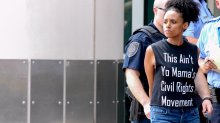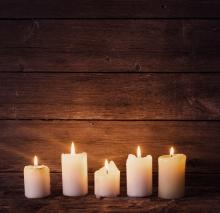jim wallis

The best gift in Santa’s pack or under the tree as far as I am concerned is a good book. Or several, even better.
This time of year, every publisher and book site on the Internet has its own “best of” list, including reviews to check out, excerpts to read and information on ordering it online.
For what it’s worth, here are some of my favorite books I read this year in case it might help you with your lists.
For fiction readers:

This weekend marks the third anniversary of the mass shooting at Sandy Hook Elementary School in Newtown, Conn. It is the second anniversary of the Gun Violence Prevention Sabbath, organized by Faiths United Against Gun Violence, which invites religious communities across the country to engage in prayer, advocacy and witness against the epidemic of gun violence, which claims 30,000 lives a year in America.

America stands at one side of a bridge right now as a white majority nation — on the other side, a country comprising a majority of minorities. This change is inevitable, but how our nation responds to it is currently unclear.
Are we headed for more conflict as too many in the shrinking white population try desperately to cling to the past? Or can we cross this bridge to a new America where we begin to see the "beloved community" that Dr. King envisioned?
On Jan. 19, the day after our country commemorates Dr. Martin Luther King Jr. Day, my new book, America's Original Sin: Racism, White Privilege, and the Bridge to a New America, will be released. As members of our Sojourners community and readers of my weekly column, I wanted you to be among the first to watch this preview.

He's trending in Amsterdam, Paris, and Washington, D.C. And he's Canada's new Prime Minister. So what are the P.M.'s priorities for Canada -- and for you? Hear from Green Party leader, Elizabeth May and veteran Liberal MP John McKay.
LORNA'S WRAP

Jim Wallis is the president and founder of Sojourners. His most recent book is The (Un)common Good: How the Gospel Brings Hope to a World Divided (Brazos).
In this episode, Jim and Matt discuss Jim’s childhood and conservative background, the impact of radical student politics on his faith, and preaching at Davos. They also touch on how mainline Protestants, evangelicals, and Catholics can all learn from one another while practicing activism as a form of proclamation.
Use the player below to listen.

Capitalism has been overdone, increasing wealth and power in the pockets of only a few. At the same time, poverty has been growing. Is that moral? Is that “do unto others?”
The cry we hear so much is that capitalism’s free markets lead to a free society. That has not been the result for people on the lower poverty rungs.

The U.S. Fifth Circuit Court of Appeals ruled on Nov. 9 against the Obama administration’s attempt to protect undocumented immigrants from deportation.
President Obama created the Deferred Action for Parents of Americans (DAPA) and expanded the Deferred Action for Childhood Arrivals (DACA) programs by executive action in 2014.

Jim Wallis has denounced a recent federal court decision that prevents, for now, the implementation of President Barack Obama's immigration reform agenda.
A three judge panel of the Fifth Circuit Court of Appeals ruled 2-1 on Monday against a federal program that would have granted an estimated 5 million undocumented immigrants legal status.
Wallis, who is the founder and president of the Evangelical social justice group Sojourners, said in a statement Tuesday that the panel majority "put politics over people."

Sojourners founder and president Jim Wallis appeared Nov. 7 on the Drew Marshall Show, a spiritual talk show that broadcasts on radio stations all over Canada. In the interview, Rev. Wallis discussed a range of topics from baseball and his love of coaching his sons, to Sojourners’ push for immigration reform, Pope Francis’ recent visit, and his upcoming book America’s Original Sin: Racism, White Privilege, and the Bridge to a New America.
Rev. Wallis also talked about his faith journey, from his experience at a revival as a child, to his leaving his home church to join the student movements in the 1960s and 1970s. He discussed the encounter with an elder in his church where an elder said that they had “nothing to do with racism. That’s political. Our faith is private.”
This exchange, Wallis noted, is what led him to eventually leave his church, only to come back to his faith after reading in Matthew 25 about how followers of Christ should treat the “least of these,” and what leads him to say that “Faith is always personal, but never private.”

FOR IMMEDIATE RELEASE
Contact: Michael Mershon, Director of Advocacy and Communications
Email: mmershon@sojo.net
Phone: 202-745-4654

When it comes to institutions aligned with evangelical progressivism it is not as easy to say “there it is” but when it comes to people, one can point directly at Jim Wallis. While I’m not convinced many Christians who seek to influence the state have an explicit teleology, an activist commitment to influence forms the heart of both the evangelical right and evangelical left. (By teleology I mean to ask this question: What will happen if they “win” the influence? Will it turn into a kind of Constantinianism?

FOR IMMEDIATE RELEASE
Contact: Michael Mershon, Director of Advocacy and Communications
Email: mmershon@sojo.net
Phone: 202-745-4654

For all the media attention paid to the Religious Right, much less energy has been spent looking into its counterpart, the Religious Left. And yet, when Barack Obama first ran for president in 2008, he appealed directly to religious voters, pairing his Christian faith with his progressive politics—something his Democratic predecessors Jimmy Carter and Bill Clinton did as well.

Think back to the images from last year in Murrieta, California, where buses of unaccompanied minors and women with children, all fleeing violence in Central America, were blocked by angry, screaming adults. In his column about this incident, the Christian evangelical, Jim Wallis, told of a talk he had recently given on immigration to his son’s fifth-grade class in Washington, DC–a class that was racially, ethnically, and religiously diverse.

The crush of religious people I have just witnessed is staggering. Under one roof, a tapestry of faiths flock together -- Buddhists, Christians, Sikhs, Muslims, Humanists, Jews -- congregated in a singular location to discuss some of the most pressing matters facing humanity today. But for every external difference of faith I see, this conference is harmonious. People are in good spirits. Here in Salt Lake City I attended my first Parliament of the World Religions -- the largest inter-religious conference in the world -- and I have been moved from what I have witnessed.

The Parliament of the World's Religions (October 15-19, 2015 at the Salt Palace Convention Center, Salt Lake City, Utah, USA) is the oldest, largest and the most inclusive gathering of people of all faith and traditions. This year the Parliament connects the dots between spirituality, culture and politics with major speakers such as the Dalai Lama, Dr. Karen Armstrong, Rev. Jim Wallis and Dr. Vandana Shiva, bringing their global wisdom and practice to the Parliament's theme, Reclaiming the Heart of Our Humanity.

Former South Carolina governor David Beasley closed a recent three day gathering focused on Islamophobia and Religious Freedom at Temple University by reminding the thirty plus leaders gathered that Jesus commanded his followers to love their neighbor. In the tone sounding more like a preacher than a former politician, Beasley exhorted, "Jesus never said, 'Love your neighbor...